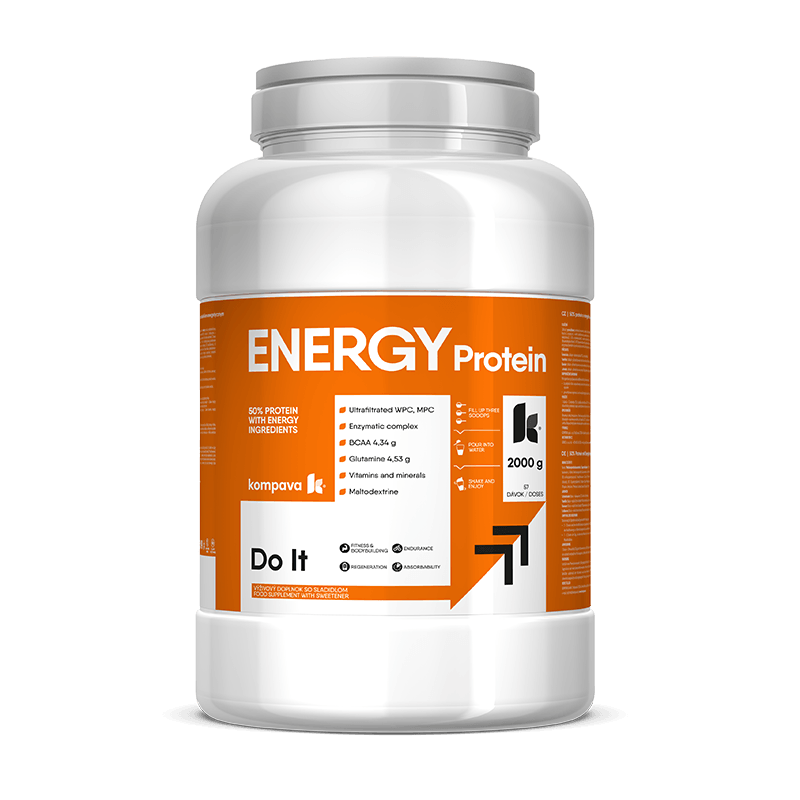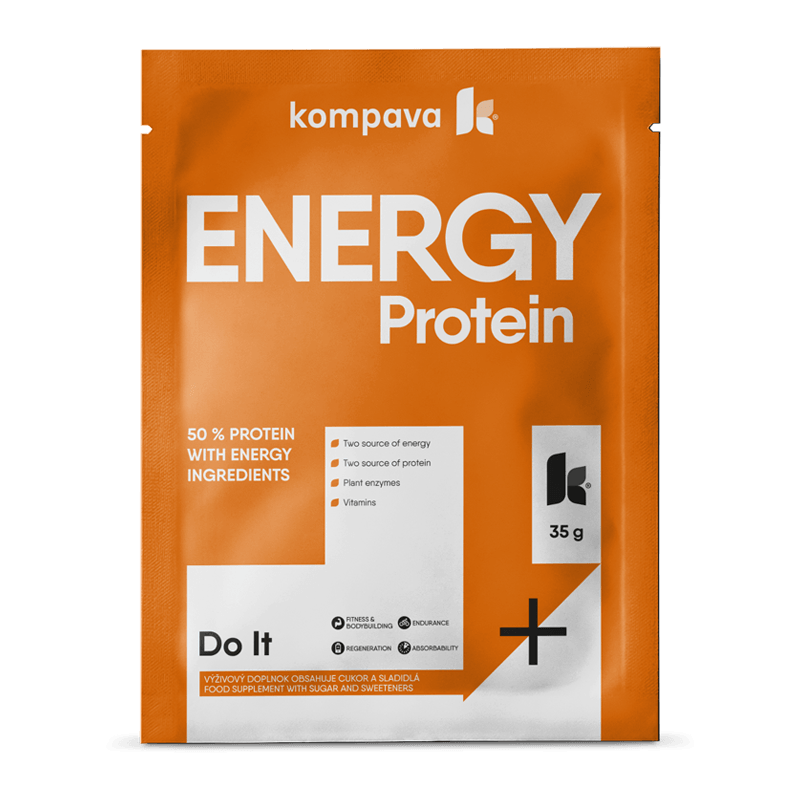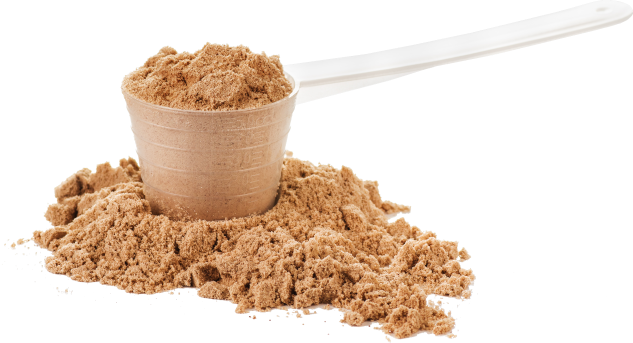
ENERGY Protein was developed for the needs of athletes and young sportsmen who consume a lot of energy during their sports performances. If you or your child are already engaged in e.g. cycling, running, football or other endurance sports, it is important that you take the lost energy and nutrients into the body as soon as possible.
Contains 50% protein and 38% carbohydrates, thus providing the body with a rich source of building materials and energy.
It is enriched with anabolic substances such as L-glutamine and BCAA, which are necessary for the growth of muscle mass, muscle protection and regeneration after a demanding training, in addition to providing the athlete with the necessary energy. The enzyme complex contained in ENERGY Protein improves its absorption, the utilization of all the nutrients contained in it and prevents bloating.
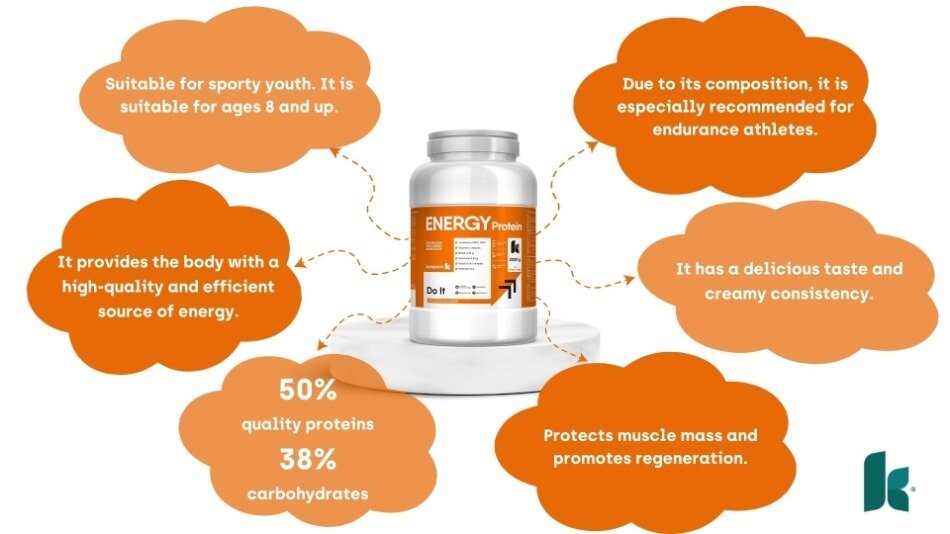
Protein is one of the key nutrients you should take in after physical activity:
- proteins regenerate muscles after physical exercise,
- proteins are necessary for the production of various enzymes and hormones that control the body's metabolic processes,
- proteins restore energy reserves in the body,
- eating protein can help keep you feeling full and prevent overeating later.
Importance of carbohydrates
Carbohydrates are of key importance for sports performance and physical activity. They are an important source of energy for the muscles and brain, and their sufficient intake can significantly affect your ability to perform intense training and achieve optimal results.
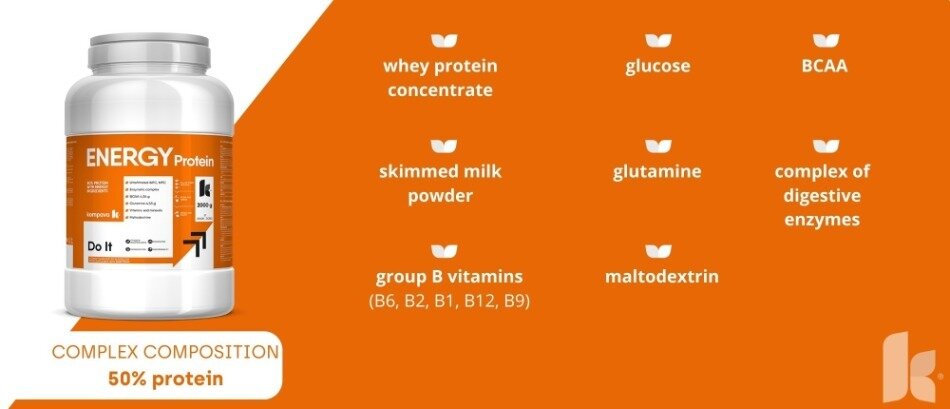
Contains ENERGY Protein
- Whey protein concentrate
Whey concentrate contains a high amount of high-quality proteins and essential amino acids. It contributes to the growth and maintenance of muscle mass and the overall recovery of the body after physical activity. - Skimmed milk powder
Skim milk powder is a source of protein. It adds a delicate milky taste and creamy consistency to the ENERGY Protein drink. - Maltodextrin
Maltodextrin provides a long-term and stable supply of energy during longer training or competition. After sports performance, maltodextrin is used to quickly restore glycogen reserves, which supports faster regeneration and readiness for the next training session. - Glucose
Glucose (grape sugar) is the primary source of energy for the body, including for the brain. It is important for the overall function of the body, including sports performance - it is quickly absorbed into the blood and thus provides the body with an immediate supply of energy. The brain is a very energy-demanding organ and therefore needs a reliable supply of sugar to function properly. Glucose is almost the only source of energy for the brain, unlike other parts of the body, which can also draw energy from fat stores. - Glutamine
L-glutamine is an amino acid that has important roles in the body, especially in muscle tissue and the immune system. L-glutamine is often referred to as the "regeneration amino acid" because of its role in the repair and regeneration of muscle tissue. It also helps to minimize muscle catabolism (decomposition of muscle tissue into energy), thus maintaining muscle mass and sports performance. Glutamine is also an important player in maintaining healthy function of the small intestine, mucosal integrity and immune response. Its sufficient supply from food is important for maintaining the overall health of the digestive system. - BCAA
BCAA (up to 4,34 g in one dose) is a group of three essential amino acids: valine, leucine and isoleucine. These amino acids have important roles in the body, especially in muscle tissue:
- Support of muscle regeneration: BCAAs help to regenerate muscle tissues faster after training.
- Protection of muscle mass: During endurance training or muscle activity, muscle catabolism occurs, i.e. the breakdown of muscles into energy. It is BCAAs that protect the muscles from breakdown and therefore from overtraining (muscle fever) and damage. - Vitamins of group B
Vitamins of the B group (B6, B2, B1, B12, B9) contained in protein play an important role in many biochemical processes in the body, including the metabolism of carbohydrates, fats and proteins. These vitamins also have a significant impact on energy metabolism, the nervous system and the formation of red blood cells. Since sports performance is often associated with demanding physiological demands on the body, B vitamins can have a positive effect on sports performance. - Complex of digestive enzymes
Digestive enzymes are biologically active molecules that play a key role in the process of digesting food.
- Reduction of indigestion:. Enzyme digestions prevent digestive problems such as feeling heavy after a meal, flatulence or cramping.
- Better absorption of nutrients: Digestive enzymes can contribute to better absorption of nutrients, including proteins, vitamins and minerals. This ensures that the body uses incoming nutrients more efficiently to support various bodily functions.
Who is the product intended for?
ENERGY Protein is suitable for celiacs and children from 8 years of age.
- Endurance athletes: Active athletes with high energy expenditure need a higher amount of protein to support regeneration and muscle growth and a dose of carbohydrates to replenish energy.
- Fitness enthusiasts: Often need more protein to support muscle growth and energy to replenish glycogen faster.
- Children from 8 years of age: Protein is suitable for young athletes but also for children with high energy expenditure. Proteins are important for the proper growth and development of children and adolescents. They ensure the formation of new cells and tissues.
- Beginners: A tasty protein for people starting sports who want to support the growth of muscle mass and replenish energy.
- Elderly people: With age, there can be a loss of muscle mass and a weakening of muscle function. Energy Protein helps maintain muscle mass and replenishes energy.
Recommended dosage
One dose 35 g = 3 scoops of ENERGY Protein.
- Adults: 1 - 2 doses per day between meals; use as a source of energy before training, for better regeneration of the body after training.
- Children: 1 - 2 doses per day between meals. Suitable for malnutrition.
